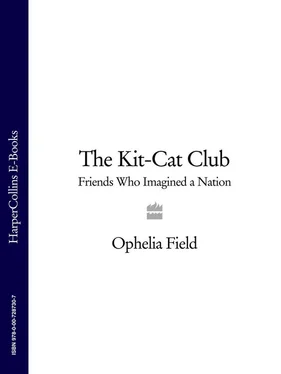Collier attacked the representation of women in the plays of Vanbrugh and Congreve as bold, libidinous and knowing creatures. He blamed the playwrights for allowing women to act these roles on stage, ‘to make Monsters of them, and throw them out of their kind’. 11 As early as 1693, when Congreve's Double Dealer was first performed, ladies were so outraged by the realism of his female characterization that, in ironic defence of their modesty, they shouted out protests during the performance and hurled things at the stage. Congreve responded that the ladies in his audiences could no more expect to be flattered by a satire than ‘to be tickled by a surgeon when he's letting 'em blood’. 12
Collier particularly criticized the Orange Comedians' disparaging view of marriage. In one sense, the Orange Comedians' attitude was simply an old joke inherited from Restoration drama, but they treated it with greater seriousness, bringing out the true dramatic tension of claustrophobic, bitter marriages. As one critic has observed, if today we are living through the death throes of the nuclear family, the Kit-Cat authors were living through its birth pangs, 13 and Vanbrugh and Congreve explored their fears of this new social unit in their work while assiduously avoiding such commitment in their own private lives. In Congreve's Old Batchelor , Bellmour summed up the author's own attitude to the married state:
Bellmour: Could'st thou be content to marry Araminta?
Vainlove: Could you be content to go to heaven?
Bellmour: Hum, not immediately, in my conscience, not heartily.
Vanbrugh's Provok'd Wife leaves its marital problems unresolved at the end of the play—a radical ending for a comedy but also a bitter truth in an age when divorce was a great rarity. Whether or not he was bisexual, Vanbrugh was certainly a confirmed bachelor in the 1690s, morbidly mocking his Kit-Cat friends whenever one of them became engaged. He gossiped to a fellow Kit-Cat, for example, that another Club member, Anthony Henley, was tying himself to ‘a mettled jade’ 14 —this was, in fact, Mary Bertie, a cousin of Vanbrugh's friend Peregrine. Mary's chief attraction for Henley was probably her fortune of some £30,000 (well over £3.6 million today, and more than enough to cover Henley's debts of £10,000). Surrounded by mercenary matches, Vanbrugh's cynicism was understandable.
The Junto members conducted their love lives not unlike the libertine characters in a Restoration or Orange comedy, and Collier's criticism of the theatre was fired by rumours about the conduct of playwrights' patrons. Wharton was described as ‘something of a libertine’, and an anonymous satire referred to his whoring. 15 He kept a mistress for many years during his first marriage, then in 1692, at 44, he married 22-year-old Lucy Loftus, who became a Kit-Cat toast in 1698 and was referred to as ‘the witty, fair one’. 16 Though Wharton seems to have been unfaithful to his young wife, Lucy was rumoured to be just as ‘abandoned’ as her husband. 17
Montagu, similarly, never treated his marriage to the dowager Lady Manchester as any impediment to his long-standing affair with a Kit-Cat toast named Mrs Catherine Barton, the niece of Sir Isaac Newton. The Duchess of Marlborough laughed at Montagu's playing the ladies' man, with ‘a great knack at making pretty ballads’, though he was so short and ‘hideously ugly’. 18 A Tory satire accused Montagu of lining his pockets with public funds that he ‘whored away or pissed against the walls’. 19 That this accusation may not have been simple libel is suggested by a Whig friend's joking remark that, when Prior and Stepney left London in 1698, Prior for Paris and Stepney for Saxony, their departures caused the business of a certain London brothel to nosedive.
Collier attacked the Kit-Cats not just for being sexual liberals but also for their godlessness. Beyond their anti-clerical one-liners, the plays of Vanbrugh and Congreve contain a fundamentally secular and cynical worldview that challenged Collier's religious faith to its core. Congreve's Way of the World has a character swear an oath on Tonson's Miscellany rather than on the Bible. While his plays epitomized the grace and elegance of the coming eighteenth century, Congreve's philosophy, at its darkest, was closer to twentieth century nihilism. He believed social conventions and good humour kept a thin lid on dark passions and the ‘power of baseness’. 20 Vanbrugh's view of life, meanwhile, was more martial and combative—a constant struggle in which God's mercy and justice played little part: ‘Fortune, thou art a bitch by Gad!’ exclaims Young Fashion in The Relapse . 21
There was virtually no avowed atheism (any more than avowed republicanism) among Whigs, yet this was the obvious accusation for Tory satirists to hurl. These satires claimed the Kit-Cat Club fomented ‘free-thinking’: one written in the voice of a Kit-Cat founder, for example, recalled that ‘'Twas there we first instructed all our youth, / To talk profane and laugh at sacred truth.’ 22 Another later proposed that the ‘great discoveries’ of atheism ‘be adapted to the capacities of the Kit-Cat…who might then be able to read lectures on them to their several toasts’. 23 Individual Kit-Cat patrons notorious for irreligion included: Wharton (who never repaired the damage done to his image by a notorious incident in 1682 when he and some friends allegedly urinated and defecated on the altar and pulpit of a Gloucestershire church); Somers, who, though a member of his local vestry, was branded a deist (that is, one sceptical about revealed religion though not the original existence of God); and Dr Garth, whose choice of profession derived from, or reinforced, his innately sceptical outlook. One Tory satire imagines Garth speaking to a dying clergyman: ‘“Why, Sir, have you the vanity to think that religion ever did our cause any service?!…I'll tell the Kit-Cat Club of you, and it shall be known to every man at C[our]t that you die like a pedant.”’ 24
In May 1698, inspired by Collier's attack and the King's call for moral reform, the Middlesex Justices of the Peace prosecuted Congreve for having written, five years earlier, The Double Dealer . Tonson and the printer Briscoe were prosecuted for publishing the play. Nobody was imprisoned or fined, but Congreve was forced to revise the play to prevent further prosecution. These revisions involved the character of the chaplain, Mr Saygrace, and deletion of allegedly profane and indecent language.
Congreve, embittered by this interference in matters literary, published Amendments of Mr Collier's False and Imperfect Citations (1698) in reply to A Short View . His main line of argument was that his words should not be judged out of context: the same justification often used against censors today and an early instance of a writer complaining against deconstruction of his text. Congreve added wit by emphasizing that smut was in the eye of the beholder: ‘[T]he greater part of those examples which he [Collier] produced are only demonstrations of his own impurity; they only savour of his utterance and were sweet enough till tainted by his breath.’ 25 The charge of prurience was fair—Collier did seem to take great pleasure in spying out immorality—but Congreve's defence was weakened by the need he felt to claim some alternative reforming purpose for his satire.
Vanbrugh was thicker-skinned than Congreve (‘Fortunately, I am not one of those who drop their spirits at every Rebuff—If I had been, I had been underground long ago’ 26 ) but his own response to Collier, A Short Vindication of ‘The Relapse’ and ‘The Provok'd Wife’ (1698), got off on an equally wrong foot by accepting Collier's premise that the purpose of theatre was to ‘recommend Virtue and discountenance Vice’. 27 King William had expressed approval of A Short View to demonstrate his sympathy with the moral crusaders, even permitting its Jacobite author impunity to come out of hiding. Knowing the King was content to see the theatres gagged, playing to the vocal Christian reformers, must have forced Vanbrugh to pull his punches and choose his words carefully.
Читать дальше












